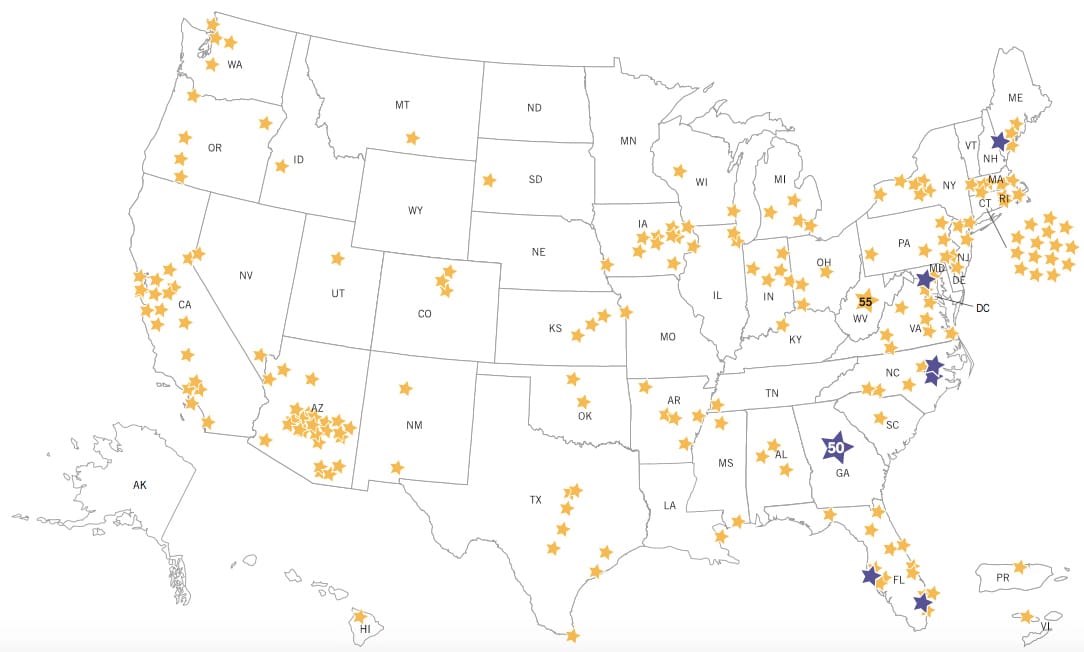Ten Georgia Counties Join the Campaign for Grade-Level Reading
Print This Post
Sixteen new communities have joined the Campaign for Grade-Level Reading (GLR), a nationwide movement to increase early reading proficiency, and 10 are from Georgia—bringing the number in this state to 50.
The new counties—Barrow, Candler, Columbia, Jenkins, Lanier, Lee, Pulaski, Toombs, Wilcox, and Worth—are partnered with Get Georgia Reading, a statewide GLR Campaign comprised of people, organizations and communities that applies a common agenda as a framework for action so that all children in Georgia become proficient readers by the end of third grade.
The newest communities to join this collaborative from other states are Broward County, Fla.; Pinellas County, Fla; Sacopee Valley, Maine; Montgomery County, Md.; Nash, Edgecombe, and Wayne counties, N.C.
“We are thrilled to welcome the newest members of our growing network of communities and to see momentum continuing to build,” said Ralph Smith, managing director of the GLR Campaign. “Their commitment to this vital mission comes at a critical time when nearly half of the children in the United States under age 5—the years of greatest brain development—live in extreme poverty. Together, we will do what it takes to ensure our nation’s most vulnerable children have the support and opportunities they need to thrive.”
Each of the new GLR Campaign communities has committed to targeting early literacy as an urgent priority and developed a comprehensive action plan to put its youngest citizens on the path to success. National tests show that two-thirds of U.S. fourth graders (four-fifths of whom are from low-income families) are not reading proficiently. Reading proficiency by the end of third grade is a critical milestone toward high-school graduation and success in later life because it marks the transition from “learning to read” to “reading to learn.” Students who have not mastered reading by that time are more likely to drop out of high school and struggle throughout their lives.
By 2020, the GLR Campaign aims to increase by at least 100 percent the number of children from low-income families reading proficiently at the end of third grade in a dozen or more states.
The communities’ action plans address three underlying challenges that can keep young children, especially those from low-income families, from learning to read proficiently:
- School readiness—too many children are entering kindergarten already behind
- School attendance—too many young children are missing too many days of school
- Summer learning—too many children are losing ground academically over the summer
Membership in the GLR Communities Network gives these local initiatives access to experts and policymakers focused on early literacy, assistance in addressing the challenges that keep many children from learning to read and opportunities to share and learn best practices from communities across the country. More than 2,300 local organizations now are at work in more than 300 communities in 42 states, the District of Columbia, Puerto Rico and the U.S. Virgin Islands, which comprise the GLR Communities Network.
About the Campaign for Grade-Level Reading
Launched in May 2010, the Campaign for Grade-Level Reading is a collaborative effort of funders, nonprofit partners, business leaders, government agencies, states and communities across the nation to ensure that many more children from low-income families succeed in school and graduate prepared for college, a career and active citizenship. By 2020, the GLR Campaign aims to increase by at least 100 percent the number of children from low-income families reading proficiently at the end of third grade in a dozen or more states. Visit gradelevelreading.net and follow the movement on Twitter @readingby3rd.
About the Get Georgia Reading Campaign
Get Georgia Reading is a collaboration of more than 100 public and private partners that are finding new ways of working together across Georgia; across sectors, agencies, and organizations; and across the early years and early grades, using data to inform decision-making. These partners have developed a clearly defined common agenda, which consists of four research-based pillars that work together to provide a platform for success: Language Nutrition, Access, Positive Learning Climate, and Teacher Preparation and Effectiveness. Visit getgeorgiareading.org and follow us on Twitter and Facebook.
Contact:
Ernestine Benedict
202-491-3950
ebenedict@gradelevelreading.net
Bill Valladares
GaFCP Communications Director
404-739-0043
william@gafcp.org
